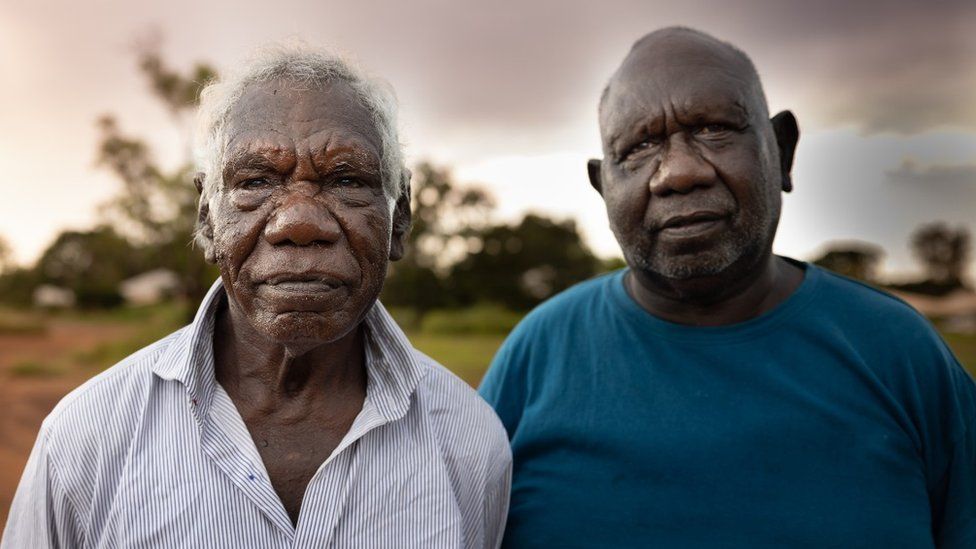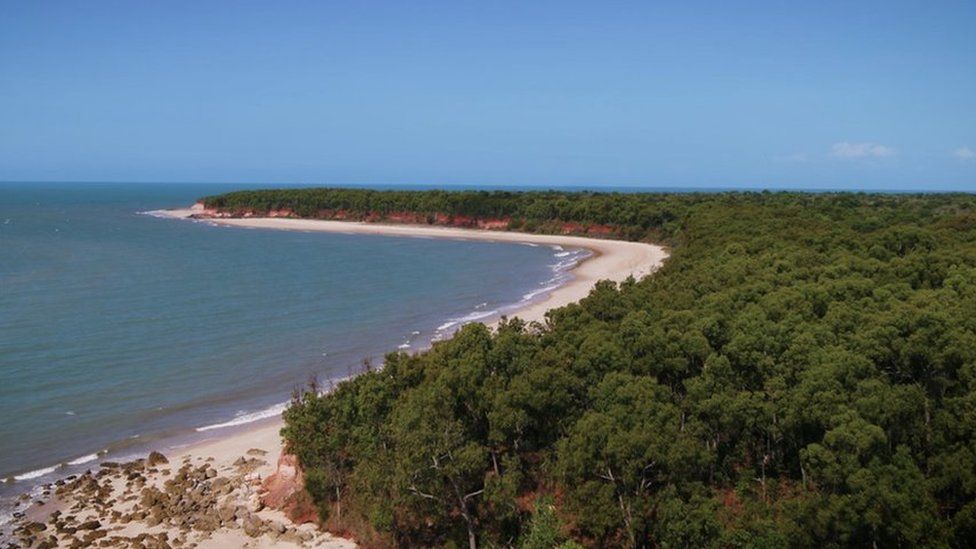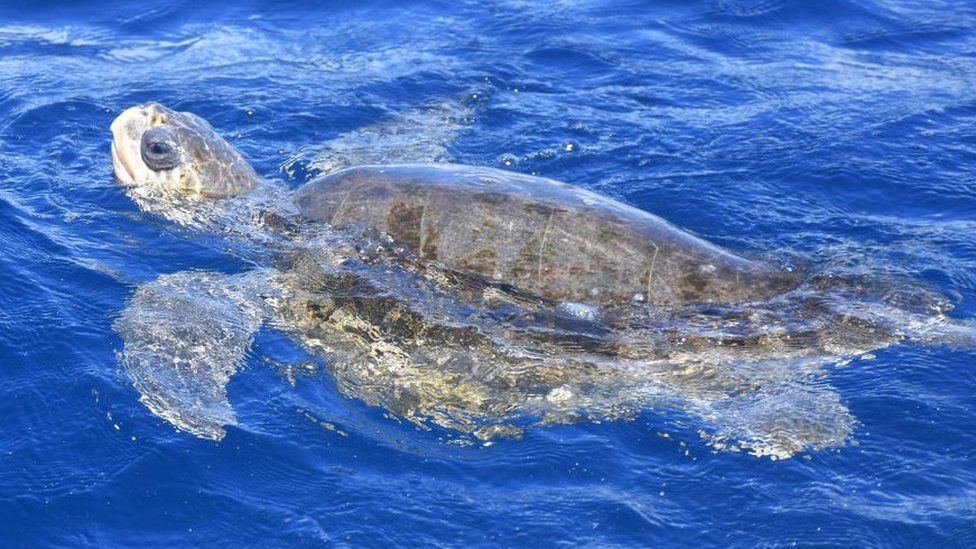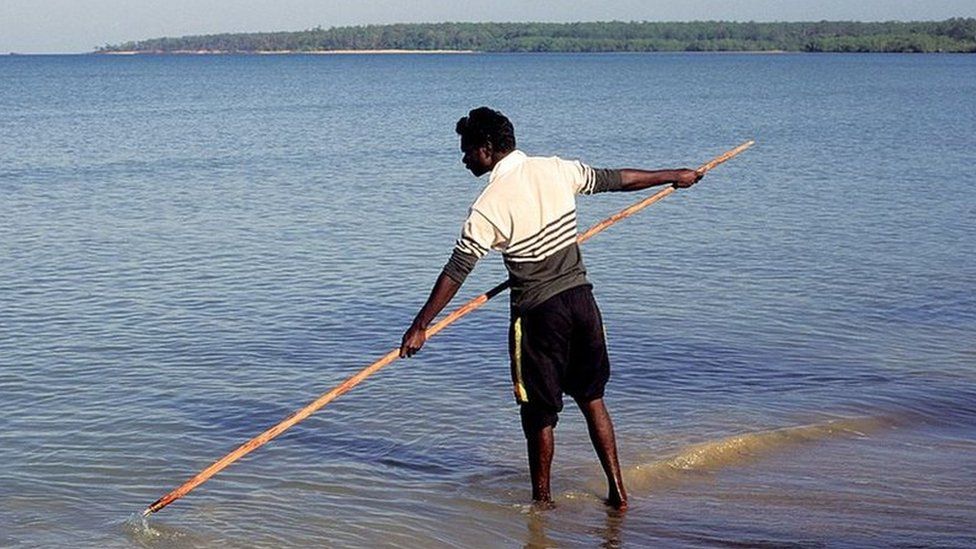South Korea sued to stop deep-sea gas pipeline
By Vivienne Nunis
Business reporter, BBC News
 REBECCA PARKER, ECNT
REBECCA PARKER, ECNTAboriginal people from northern Australia have filed a lawsuit aimed at stopping South Korea funding a proposed deep-sea gas field.
They say a 300km gas pipeline threatens their way of life and risks harming turtles near their Tiwi Islands home.
The Barossa gas field, located in seas north of Darwin, was partially approved by Australia's offshore energy regulator last week.
The gas giant Santos plans to begin drilling wells in the next few months.
If the project is given full approval, Santos wants to construct an undersea gas pipeline alongside Bathurst Island, the western-most island in the Tiwi archipelago. At its closest point, the pipeline will be 6km from shore.
 REBECCA PARKER, ECNT
REBECCA PARKER, ECNTAboriginal groups from the Tiwi Islands, located in the Timor Sea north of Australia, say they were not properly consulted about the project.
The legal challenge aims to prevent South Korea from lending approximately A$950m (£530m) to Santos via the state-owned Export-Import Bank of Korea and the Korea Trade Insurance Corporation.
Lawyers filed an injunction in the Seoul Central District Court on Wednesday under a law known as the Korean Civil Execution Act.
It seeks to prevent potential damage - either to the environment or to South Korea's future financial position if the investment fails - by prohibiting the financing from going ahead.
If the legal action is successful, lawyers say the financial viability of the entire project is at risk.
Jikilaruwu Tiwi Island clan leaders Francisco Babui and Daniel Munkara have accused Santos and the previous owner of the project, ConocoPhillips, of disregarding the islanders' concerns.
"Under Australian law and in accordance with Aboriginal tradition, the Jikilaruwu clan is the owner of the sea country where that gas pipeline will go through. We are the decision makers for that sea country," Mr Munkara said in a statement released by the Stop Barossa Gas Campaign group.
"We were told briefly about the pipeline in 2018 and we said 'no' to the project. They said it wasn't happening. Now we find out Santos wants to lay the pipeline through our sea country without our consent."
Santos declined to comment.
'Wild frontier'
Environmental campaigners in Australia have long criticised the Barossa plan.
They say the proposed gas field and pipeline will damage the unique marine environment in the Timor Sea, including turtle nesting areas.
"You've got this massive continental shelf that extends off northern Australia, and that continental shelf is covered in big drowned river valleys, which means there's a real diversity of habitat," said marine biologist Jason Fowler from the Environment Centre Northern Territory, which is supporting the legal fight.
 CARLOS TISCHLER/GETTY IMAGES
CARLOS TISCHLER/GETTY IMAGES"The Timor Sea is quite warm and shallow and muddy - it's dominated by sponges, not corals," he said.
"There are over 900 species of sponges out there, some of them are undiscovered. We've only mapped about 10% of this area. So it's very much a wild frontier, that we are only just beginning to understand."
The pipeline Santos proposes would pass through an area designated as as a "habitat protection zone" in the Ocean Shoals Marine Park.
Under Australian government rules for the management of marine parks, gas pipelines can be constructed within such zones under license.
Those rules were approved by Australian Treasurer Josh Frydenberg when he was the minister for energy and environment in 2018.
Mr Fowler said he lobbied Mr Frydenberg at the time, and asked him to introduce stronger protections for marine parks, but that the minister had "ignored the science and listened to the oil and gas industry".
"When you build a gas pipeline across the sea floor, it's like building a railway line across the country," he said.
"You've got to build bridges over valleys, you've got to dredge out areas of high ground, you've got to try and make it as flat and even as possible, because you don't want your pipeline going up and down. So there's a lot of habitat modification."
Tiwi Islander Francisco Babui echoes those concerns.
"The pipeline is too close to Cape Fourcroy [on the islands' western tip]. There is a reef there with lots of turtles and dugongs," he said. "The turtles lay their eggs on that beach and we go hunting in that area. We use that coastline for camping and fishing.
 GETTY IMAGES
GETTY IMAGESOther critics of the Barossa plan have questioned the viability of drilling for gas that contains a relatively high proportion of carbon dioxide.
John Robert, a chemical engineer with 40 years' experience in the oil and gas sector, said that means carbon emissions from Barossa will be especially high.
"The Barossa project would produce about one and a half tonnes of CO2 for every tonne of Liquefied Natural Gas (LNG) it produces, so it would in fact be a CO2 factory with an LNG by-product," he said.
"And that's before you transport it, turn the LNG back into natural gas, and then burn it in a power station. So it's going to be about the dirtiest LNG around. But unfortunately Santos seems very determined to move ahead with it."
Mr Frydenberg and ConocoPhillips declined to comment.
Australia's offshore energy regulator, the National Offshore Petroleum Safety and Environmental Management Authority, said a range of environmental and safety approvals need to be granted before gas extraction or production can begin at the Barossa field.
No comments:
Post a Comment